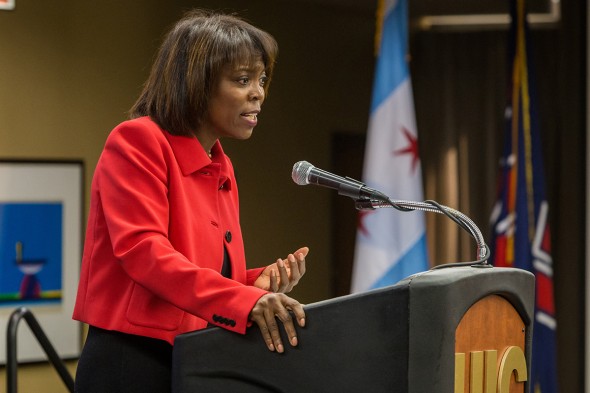UN director: supply adequate food or ‘fail humanity’

Ertharin Cousin, executive director of the United Nations World Food Programme, speaks Friday in Student Center East. “We must resist every effort to politicize the humanitarian space,” she says. Photo: Matthew Kaplan
“If we fail to assert humanitarian principles and the right to assist populations, then we also fail humanity,” says Ertharin Cousin.
Cousin, executive director of the United Nations World Food Programme, spoke to a crowd at Student Center East Friday on the importance of delivering food assistance to the world’s most vulnerable populations.
“Not caring is not an option — those who are most in need depend upon us,” said Cousin, a 1979 UIC graduate in criminal justice, whose talk was sponsored by the Chancellor’s Initiative in the Humanities.
The World Food Programme assisted nearly 100 million women, men and children in more than 70 countries last year. However, she said, those who are most in need are often the most difficult to access — about 842 million people across the world need food.
One difficulty involves the politicization of humanitarian space — the safe and protected access of agencies providing assistance. “Sometimes humanitarian action is equated with attempts to delegitimize the state,” Cousin said.
“The tension between the need to deliver life-saving assistance and to assert humanitarian principles is one of the most significant challenges that we face.”
Achieving these principles of humanity, impartiality and neutrality while providing aid for victims of a fractured state is often varying and complex, she said.
“There is no rule book to guide us in striking the right balance,” she said. “It is a constant effort that plays out every day in our organization.”
Attempts to provide aid in areas such as Syria and the Democratic Republic of Congo, where violence is constant, are often seen as threats, Cousin said.
The result is an increased risk of violence for humanitarians delivering aid.
Violent attacks against aid workers have more than tripled since 1997 and the number of aid workers killed on duty has nearly doubled. The number of aid workers kidnapped has tripled, Cousin said.
“We have an obligation to prevent and alleviate hunger, and must weigh these obligations against concerns related to respect for life, health and dignity,” she said. “Then and now, the choice is difficult.”
Cousin pointed to recent difficulties the program faces in getting aid to those caught between opposing forces in the Democratic Republic of Congo while maintaining safety for the workers delivering the aid.
“We must resist every effort to politicize the humanitarian space,” Cousin said.
“Humanitarian action must be de-linked from the security agendas of state and non-state armed actors. The only way to accomplish this is through dialogue.”
